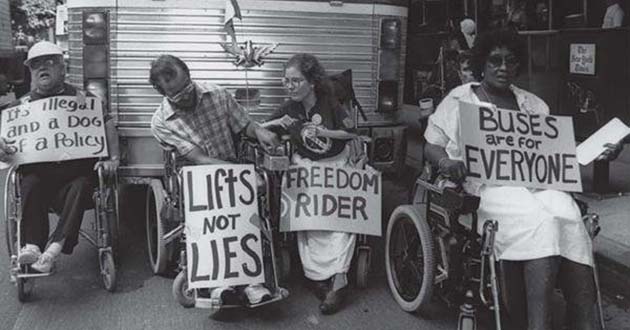Defiant Lives, a documentary by Australian filmmaker Sarah Barton, charts the history of a relatively unknown struggle against oppression: the disability rights movement. It showcases archival footage and interviews with leading activists from the movement in the US, UK and Australia.
The film covers protests against the warehousing of disabled people in institutions or nursing homes. Traditionally, children born with significant impairments were written off and segregated in impersonal, prison-like institutions.
In response, the independent living movement fought successfully for deinstitutionalisation. However, in most cases deinstitutionalisation just placed extra pressure on families to pick up the slack. Without adequate support and a universal welfare system, the lives of people with disabilities and their families remained hard.
A disability activist interviewed in the film makes the important point that for independent living to be a success, the pay and conditions of the workers who care for disabled people must be decent. This is something to keep in mind today with the rollout of the National Disability Insurance Scheme (NDIS), which threatens to undermine the pay and conditions of the disability workforce.
A key theme of the film is the social model of disability, a definition of disability that emerged from the disability rights movement in the early 1970s. In an era of combative social movements, people with disabilities began rejecting the idea that the cause of their oppression was biological and personal, instead insisting that it originated in the society around them.
This new definition rested on the distinction between impairment and disability. Someone may have an impairment (for example lacking a limb) but only becomes disabled by a society that fails to meet their additional needs.
The social model is now the accepted definition of disability, but was pioneered by disabled socialists in the UK. One of them was anti-apartheid activist Vic Finkelstein, who alongside Paul Hunt founded the Union of Physically Impaired Against Segregation in 1975.
Fighting discrimination
There were a number of high profile victories in the US. One was the fight to implement Section 504 of the Rehabilitation Act. The Act itself, passed in 1973 by the Republican administration, mostly disappointed disability activists. However Section 504 included a sentence outlawing disability discrimination in government-funded services.
People mobilised in nine cities across the country to demand its implementation. In Washington protesters occupied the Health, Education and Welfare (HEW) offices for 28 hours before the authorities’ refusal to allow food in starved them out.
But in San Francisco where activists had built support networks in advance, 120 activists occupied the offices of the HEW for 25 days! Illustrating the connections between struggles in this inspiring period, the film shows footage of the Black Panthers delivering food to the occupiers, while churches and unions also contributed.
The defiance of the occupiers and the solidarity they received from the wider community forced President Jimmy Carter to finally concede their demands.
Accessible public transport was a battleground common to the American, British and Australian disability rights movements. The film shows incredible footage of activists taking to the streets and putting their bodies on the line to demand equal access to public transport.
As an American activist put it, “Black people fought for the right to ride in the front of the bus. We’re fighting for the right to get on the bus.”
In footage from a protest in Australia, police arrested protesters but were forced to de-arrest a wheelchair user because the police divvy van wasn’t wheelchair accessible.
The documentary, covering the history of the oppression of disability as well as the struggle against it in three countries, feels at times to be too broad in scope. Towards the end we see Julia Gillard speaking at a rally welcoming the NDIS, with chants of, “What do we want? NDIS! When do we want it? Now!”
This cursory inclusion of the NDIS sits awkwardly with the radical movements that make up the rest of the film. A disability academic interviewed towards the end declares that a neo-liberal, market-oriented society is incompatible with rights and dignity for people with impairments.
Yet the NDIS is entrenching precisely this kind of competitive market into disability services, a move which people with disabilities and unions are resisting. It’s actually the resistance to the sell-off of public disability services accompanying its rollout which is more in keeping with the rest of the film.
Notwithstanding these criticisms, Defiant Lives is an inspiring primer to an underappreciated social movement that will leave you wanting to find out more. A good place to look is Roddy Slorach’s recent book A very capitalist condition: a history and politics of disability.
By Lachlan Marshall
Defiant Lives
Directed by Sarah Barton
You can host a screening of Defiant Lives using Demand Film or for a community group visit defiantlives.com for details






